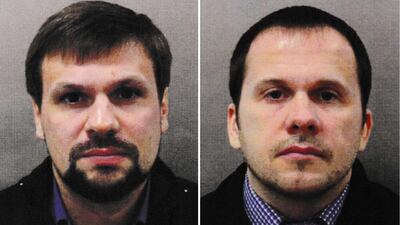The second Russian who Britain says was responsible for the poisoning of former double-agent Sergei Skripal was a military doctor for the GRU military intelligence unit, investigative website Bellingcat said on Monday.
Bellingcat said the real name of the man previously known as Alexander Petrov was Alexander Yevgenyevich Mishkin.
“Bellingcat’s identification process included multiple open sources, testimony from people familiar with the person, as well as copies of personally identifying documents, including a scanned copy of his passport,” the website said.
_______________
Read more:
Russian agents hacked OPCW a week after Douma attack
Global pushback on Russian hacking as Dutch thwart cyber attack on chemical weapons watchdog
Sergei Skripal was a 'scumbag' and traitor to motherland Vladimir Putin says
_______________
Earlier, Russia’s foreign minister had dismissed accusations made in the Netherlands against suspected Russian spies, saying they were intended to distract public attention from stark divisions between Western nations.
Sergey Lavrov’s comments were a defiant statement that comes amid soaring Russia-West tensions.
Last week, Dutch officials alleged that four agents of the GRU tried and failed to hack into the world's chemical weapons watchdog, the Organisation for the Prohibition of Chemical Weapons.
British authorities also accused the GRU of a series of global cybercrimes, and the US Justice Department on Thursday charged seven GRU officers with hacking anti-doping agencies and other organisations.
Commenting on the Dutch allegations, Mr Lavrov insisted that the four Russians were on a “routine” trip to The Hague in April when they were arrested and deported by Dutch authorities.
“There was nothing secret in the Russian specialists’ trip to the Hague in April,” Mr Lavrov said at a briefing after talks with Italian counterpart Enzo Moavero Milanesi.
“They weren’t hiding from anyone when they arrived at the airport, settled in a hotel and visited our embassy. They were detained without any explanations, denied a chance to contact our embassy in the Netherlands and then asked to leave. It all looked like a misunderstanding.”
Dutch defence officials on Thursday released photos and a timeline of the GRU agents’ botched attempt to break into the chemical weapons watchdog using Wi-Fi hacking equipment hidden in a car parked outside a nearby Marriott Hotel.
The OPCW was investigating a nerve agent attack on Mr Skripal and his daughter in Salisbury, England, that Britain has blamed on the Russian government. Moscow denies involvement.
Photographs released by the Dutch Ministry of Defence showed a trunk loaded with a computer, battery, a bulky white transformer and a hidden antenna. Officials said the equipment was operational when Dutch counterintelligence interrupted the operation.
Mr Lavrov did not comment about the evidence provided by Dutch authorities, but President Vladimir Putin's spokesman, Dmitry Peskov, challenged the Netherlands to provide specific information via official channels.
Asked if the Kremlin was considering reshuffling the leadership of the Defence Ministry and the GRU following the Dutch accusations, Mr Peskov said “that kind of information naturally can’t be the basis for it.”
Mr Lavrov criticised Dutch officials for using what he called “loudspeaker diplomacy” instead of using legal mechanisms to look into the issue. He said Moscow summoned the Dutch ambassador on Monday to deliver the message.
Speaking to the media outside the Russian foreign ministry building, Dutch ambassador Renee Jones-Bos said that “we can’t tolerate cyberattacks on international organisations,” noting that Dutch officials made it clear last week.
“We made a very clear signal that this has to stop” Ms Jones-Bos added.
Mr Lavrov, meanwhile, argued that the April incident was “dug up and thrown into the public domain now to help distract attention from difficult issues on the agenda of the EU and Nato.”
He also alleged that the accusations could also be timed to coincide with this week’s meeting of the international chemical weapons watchdog, where Western nations would push for empowering it to name culprits in chemical attacks.
Russia strongly opposes that, arguing that only the UN Security Council should have such authority.

